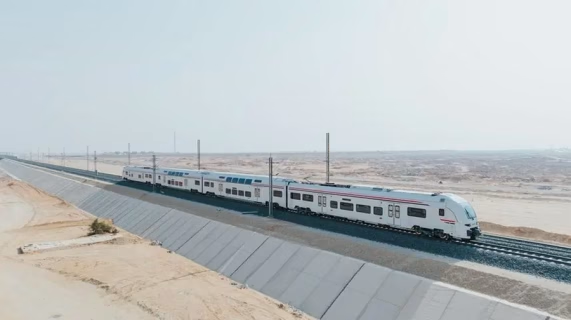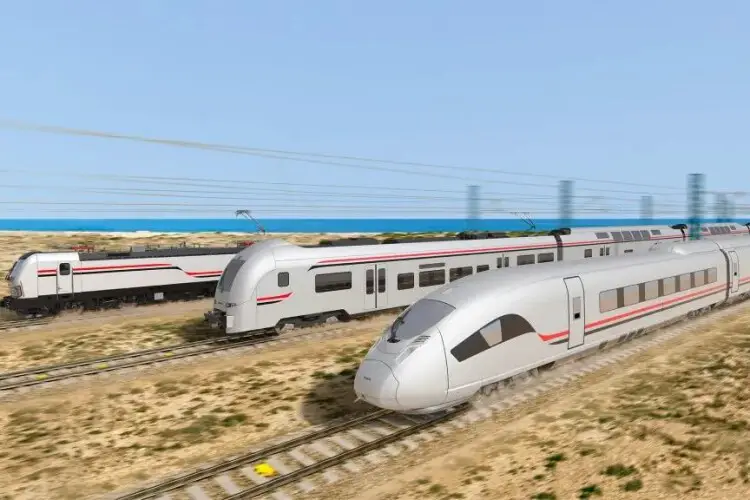Updated November 10, 2025: The high-speed rail network in Egypt is taking shape as trial operations on the $9 billion project commence. The project is also the world’s sixth-largest of its kind stretching 2,000 kilometers. The announcement was made at the International Smart Transport and Logistics Exhibition and Conference (TransMEA) in Cairo. Through a live broadcast, the Prime Minister witnessed the movement of the regional ‘Desiro’ train along the route of the high-speed line in the October Gardens area. Furthermore, it passed through the Water Bridge and Fayoum Bridge up to kilometer 143. The Prime Minister also visited the ‘Velaro’ high-speed train, showcased in the outdoor exhibition area. The network will be served by 41 high-speed Velaro trains and 94 Desiro regional trains. It will also be served by 41 Vectron locomotives, all supplied by Germany’s Siemens Mobility. The company is currently building the project in partnership with Orascom Construction and The Arab Contractors. Egypt is making commendable progress in its railway projects with projects such as the Egypt-Sudan railway project being highlights of this commitment.

The Scope of Implementation on the High-Speed Rail Network in Egypt
Egypt high-speed rail network comprises three lines, these include the:
- Ain Sokhna – Marsa Matrouh via Cairo and Alexandria (660km), also called the Green Line and Suez Canal on Rails.
- October Gardens (6th of October) – Abu Simbel (1,100 km)
- Safaga – Hurghada – Qena (225 km)
Siemens Mobility said in a related press statement that the Desiro HC regional train successfully completed its first train run on newly constructed tracks near the 6th of October Depot, west of Cairo. This adds that the regional train’s commissioning is planned for the Green Line. The statement noted that the Velaro high-speed train seats 489 passengers and can reach speeds of up to 250 km/h. Furthermore, it notes that the trains are specially adapted for Egypt’s desert conditions. In November 2023, Egypt aimed to invest nearly $7.8 billion in the project’s first phase. The project spans 660km from Ain Sokhna to Marsa Matrouh via Cairo and Alexandria.
4th September 2025: Egypt is among the few countries in Africa with a high-speed rail development. The country awarded a construction contract for its 2,000-km high-speed rail. The contract was awarded to NGE through its rail expertise subsidiary, TSO. NGE was required to execute the contract with Arab Contractors and Orascom.
The contract entailed the development and construction of 330 kilometers line. This line would connect the Red Sea port of Sohna with Borg al-arab near the Mediterranean port of Alexandria. This line would further extend for an additional 270 kilometers to Marsa Matrouh which lies right on Egypt’s northwest coast.
Also, plans were unveiled to build another line from Cairo to Luxor and another one between Luxor and Hurghada on the Red Sea Coast.
Similarly, Morocco is gearing up well with its high-speed rail infrastructure region. The country’s high-speed rail infrastructure also known as Al Boraq, is currently undergoing further development in the Kentira-Marrakesh route. Regarding this route, China’s CSCEC was awarded steel contracts recently for this high-speed rail. Additionally, Morocco’s ONCF launched upgrade works of the high-speed rail in Casablanca. The high-speed rail project is part of Morocco’s preparations ahead of FIFA World Cup 2030.
January 2021
Siemens Mobility to install first-ever high-speed rail network in Egypt
The National Authority for Tunnels, a governmental authority under the jurisdiction of the Ministry of Transport of Egypt, and Siemens Mobility have signed a Memorandum of Understanding (MoU) together with the local companies Orascom Construction S.A.E. and The Arab Contractors (Osman Ahmed Osman & Co.), to design, install and commission Egypt’s first-ever high-speed rail transportation system.
Additionally, Siemens Mobility will be providing maintenance services. The agreement comprises a rail system with a network of 1000km, with the first being a 460km high-speed line. The order value of this initial high-speed line is around US $3bn.
The MoU was signed by Essam Waly, Chairman of Egypt’s National Authority for Tunnels, and Michael Peter, CEO of Siemens Mobility, in Cairo. This was witnessed by His Excellency, Prime Minister Mostafa Madbouly, His excellency, Minister of Transport Egypt Kamel Al-Wazir, as well as Siemens CEO Joe Kaeser and Siemens Deputy CEO Roland Busch.
According to Joe Kaeser, the President and Chief Executive Officer of Siemens AG, by building a high-efficiency rail system for the country, the company will support the Egyptian people with affordable, clean, and reliable transportation.
“We are honored and proud to expand our trustful partnership with Egypt. After the highly successful energy Megaproject, we are now keen to repeat this visionary spirit in the mobility sector together with our partners,” he added.
The high-speed rail system
The first 460km long high-speed rail system will connect the vastly developing cities of El-Alamein on the Mediterranean Sea to Ain Sokhna on the Red Sea, while also passing through the New Administrative Capital. The line will also be operable for freight transport purposes which will further foster economic growth in the region.
September 2021
Construction works on Egypt’s first high-speed railway begins
Construction works have begun on Egypt’s first high-speed railway from Ain Sukhna, parallel to the Hurghada road, to Marsa Matrouh, respectively on the Red Sea coast and the Mediterranean coast, have begun.
The project is planned to have four legs. The first line is planned to run from Ain Sokhna, through Egypt’s New Administrative Capital, to El Alamein on the Mediterranean coast, while the second leg of the railway will link the Red Sea’s main port with Alexandria and the port of Matrouh Gargoub.
The third lane will connect Hurghada and Safaga with Qena and Luxor, and the fourth will connect Six October city with Luxor and Aswan.
Reportedly, preparation works on the path including digging the mountains in the distance from Helwan and May 15th to the Administrative Capital have already begun. The contracting companies participating in the implementation of the project, resort to using explosives to detonate the mountains that cross the railway path.
The entire project is expected to be fully operational in 24 months’ time from the day the construction works begin.
Project team
Egyptian/Local contracting companies, particularly Orascom Construction and Arab Contractors, are involved in the work of preparing the track and the road on which the express train will run in parallel with the initiation of the construction of the stations along the route.
Germany’s Siemens Mobility will be implementing the project’s signaling and communication systems and supplying the trains that will operate on it after its implementation.
Reportedly, the parties involved will be paid US$ 23bn for building and maintaining the rail network over 15 years according to a memorandum of understanding signed with Egypt’s National Authority for Tunnels back at the beginning of this year (2021).
June 2022
A new deal was signed for the 2,000-km high-speed rail network in Egypt
Siemens Mobility and its partners Orascom Construction and Arab Contractors inked a deal to construct the world’s sixth-largest high-speed rail system, with Egypt’s National Authority for Tunnels (NAT), a governmental authority under the jurisdiction of Egypt’s Ministry of Transport.
The integrated high-speed rail network for people and cargo will connect 60 cities across the country with trains capable of hitting speeds of up to 230 kilometers per hour. For 15 years, the consortium will design, install, commission, and maintain the complete system. It is estimated that when all aspects of the project are completed, up to 40,000 jobs will be created in the region.
Siemens Mobility’s share of the combined deal, which is the company’s largest in history, is €8.1 billion, with a €2.7 billion first contract for the first line inked in September 2021.
41 Velaro eight-car high-speed trains, 94 Desiro high-capacity four-car regional train sets, and 41 Vectron freight locomotives will be delivered. It is said that Orascom Construction has US $1.2 billion shares in the recently signed phase, bringing the total share in all three lines to US $1.8 billion.
It is said that the contract is with the Egyptian National Authority for Tunnels (NAT), which is part of Egypt’s Ministry of Transport.
There will be three lines in the high-speed network. The 660-kilometer line linking the Red Sea port cities of Ain Sokhna and Marsa Matrouh to the Mediterranean port cities of Marsa Matrouh and Alexandria has already been announced.
It is said that one of the two new lines is a 1,100-kilometer route from Cairo to Abu Simbel near the Sudanese border, which links the megacity to emerging economic centers in the south. The third line, which will be 225 kilometers long, will link Luxor’s world-heritage archaeological sites with Hurghada on the Red Sea. It is expected that the rail link will greatly enhance the efficiency and long-term sustainability of freight transport for commodities and materials between Safaga harbor and inland regions.
Impacts of the integrated high-speed rail system on the environment
The integrated high-speed rail network in Egypt will be accessible to approximately 90% of Egyptians. The fully electrified network is anticipated to reduce carbon emissions by 70% when compared to current vehicle or bus transportation.
According to Egypt’s President Abdel Fattah El-Sisi, the new electrified train network comes as a consolidation of Egypt’s and Germany’s fruitful cooperation in the field of infrastructure and will represent a valuable addition to Egypt’s transport system, marking the dawn of a new era for the railway’s system in the country, Africa, and the Middle East.
Dr. Roland Busch, Siemens AG president and chief executive officer, stated that the chance to provide Egypt with a modern, safe, and budget-friendly transportation system will transform the daily lives of millions of Egyptians, create thousands of local jobs, and reduce CO2 emissions in transportation is an honor for the company. Adding that the project would not only enable Egypt to grow economically, but it will also help the country develop in rail transport.
He claimed that Egypt will boast the world’s sixth-largest and most modern high-speed rail system, thanks to the country’s cutting-edge rolling stock, signaling, and maintenance services. He also stated the project is the largest order in Siemens’ history.
According to Siemens Mobility CEO Michael Peter, the iconic transportation project is genuinely historic for both Egypt and Siemens. He said that they were honored to join the Ministry of Transport to reinvent the future of transportation in the country.

Leave a Reply